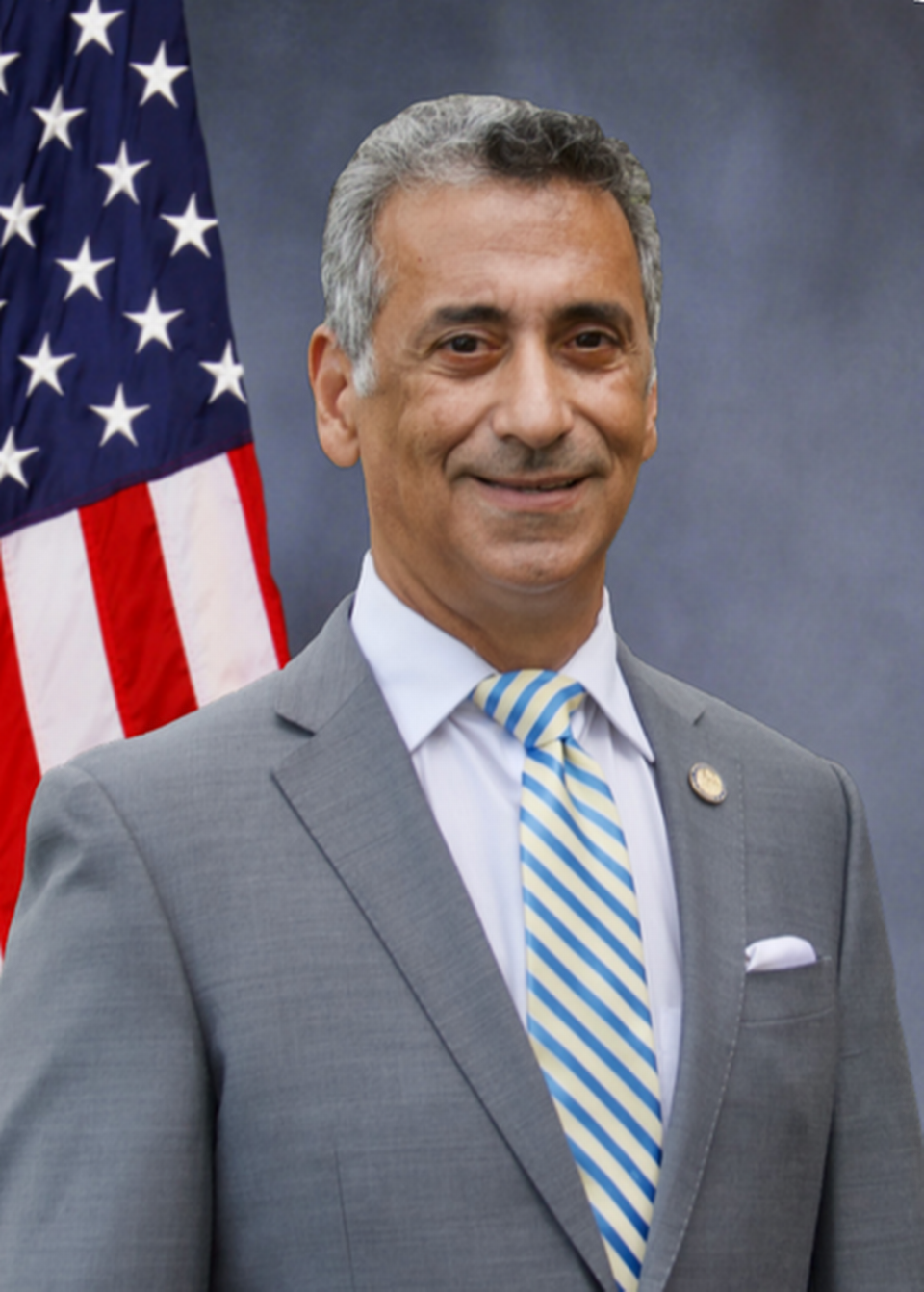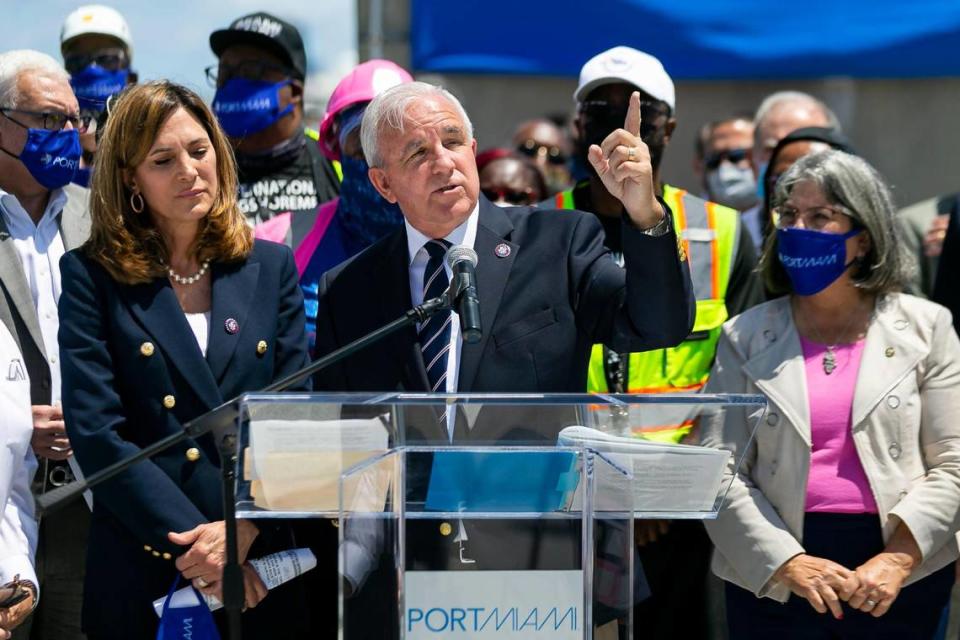Challenger to U.S. Rep. Carlos Gimenez targets votes against certifying 2020 election
- Oops!Something went wrong.Please try again later.
- Oops!Something went wrong.Please try again later.
Before even getting into why Robert Asencio decided to challenge a Republican U.S. House member with one of the most recognizable names in Miami-Dade County, the former police officer pivots to the biblical story of David and Goliath.
“It’s a little tongue-in-cheek. But it’s also reality, right?” he asks, somewhat rhetorically.
Asencio certainly lacks the popularity of Carlos Gimenez, a decades-long public servant who ran one of the largest cities in the Southeastern U.S. and parlayed that into two terms overseeing Miami-Dade County before earning a seat in Congress two years ago.
Asencio, 59, also trails badly in fundraising in the race for Florida’s 28th Congressional District. As of early August, the Democrat had collected just over $27,000, which paled in comparison to Gimenez’s $1.8 million haul. The contest isn’t particularly high-profile, with Gimenez expected to coast to victory. And neither party has thrown much money at its candidate.
Still, Asencio isn’t a novice. He spent almost three decades as a Miami-Dade Schools Police officer and has local union support. In 2016, he parlayed those decades of social service into a state House victory by defeating David Rivera, a well-known but politically wounded ex-congressman, by a narrow 53 votes. Two years later he lost the same House seat. He followed that up with an unsuccessful run for the Miami-Dade County Commission.
He says he’s now up to the daunting task of taking on a local political heavyweight with money and name recognition whose party is widely expected to take back control of the U.S. House of Representatives in November.
“It’s not impossible. I live in the district,” Asencio says, taking a slight dig at his opponent’s Coral Gables homestead outside the district, which is permissible in a federal election.
“I’m not happy with his votes. Like the vote to not certify the election in 2020,” Asencio said. “He voted against certifying Pennsylvania and Arizona with no proof of any criminal or any kind of wrongdoing. He bought into the ‘big lie.’ The end result is he went against the people’s vote and it’s the most precious right we have.”

Next month all 435 U.S. House seats are up for election. Like other Democratic challengers, Asencio’s chances could depend on whether the electorate takes enough issue with the Republican House representatives who, like Gimenez, voted against certifying President Joe Biden’s victory in the 2020 election.
“It should matter,” said Sean Foreman, professor of political science at Barry University. “But I don’t think the election denier position matters much with the Republican base. I’m not sure why. It might just be blind loyalty to the Trump agenda at all costs.”
Gimenez says he voted against certifying presidential election results that went Biden’s way in Pennsylvania and Arizona because of pandemic-era rule changes that allowed for late ballot counting that weren’t established law. The congressman also said he knew his vote would not have changed the outcome of the election.
“I can count,” he said.
But when asked if he would have voted the same way had he believed it would have changed the outcome, Gimenez paused and didn’t give an answer before saying it was “speculation.”
The congressman’s early 2020 vote came on the heels of his exit from Miami-Dade, when during a farewell ceremony at PortMiami, he said, “It’s all about collaboration and results. People want their elected leaders to work together for the greater good. They don’t want us to get stuck in partisan, broken potholes.”

CENSUS RESULTS LED TO DISTRICT CHANGE
Florida’s 28th Congressional District is brand new and one of only seven newly apportioned districts nationwide to come out of the 2020 Census. Similar to Gimenez’s 26th District, it is a sprawling region that essentially runs from Sweetwater and Kendall south to Homestead and Florida City and through the Florida Keys to Key West. Its 770,000 residents represent a diverse population, from suburban housewives in Kendall to the migrant workers of South Dade, down to the fiercely independent lifers of the Conch Republic.
Gimenez won his post two years ago in a close contest against then-incumbent Debbie Mucarsel-Powell. His two-year term began with chaos on Jan. 6, but also with moderate votes that political watchers like Foreman, the Barry professor, said had him on the ropes with some of his base.
In one instance, Gimenez sided with the Democratic majority on gun control measures. The other vote was for the creation of a bipartisan Jan. 6 committee to look into the failed insurrection, which was eventually scrapped.
Foreman said Gimenez quickly got “back in line” after receiving “blow-back.” Since then, Gimenez voted against the election reform act, which failed, and the president’s Inflation Reduction Act, which passed. He has also voted in favor of legal protections for transgender and same-sex marriage.
“I’m a fiscal conservative,” the congressman told the Miami Herald. “I believe in equal opportunities for all. But I don’t believe in communism or socialism.”
ELIAN SAGA PROPELLED GIMENEZ POLITICAL CAREER
Gimenez, 68, married for almost five decades and with three grown children, began his professional career as a Miami firefighter in 1975. He would eventually become chief and later be appointed city manager after Donald Warshaw was fired amid the fallout when young rafter Elián González was extracted from his family’s Little Havana home in 2000 by federal agents.
That was followed by two terms as a Miami-Dade commissioner and then a county mayoral victory in the wake of Miami-Dade Mayor Carlos Alvarez’s recall. Gimenez’s 2011 mayoral election win came after votes against local funding for the Florida Marlins ballpark in Little Havana and a promise to cut his salary and benefits by 50%. (By 2018, Gimenez received a pay increase that raised his salary to $250,000 a year. He said it was time after earning so little the previous seven years and that the economy had become “strong.”)
As mayor of Miami-Dade, Gimenez said he voted for Hillary Clinton in 2016. But he caught the attention of then-President Donald Trump when he ordered the county jails to heed Immigration and Customs Enforcement requests after Miami-Dade was flagged as a sanctuary jurisdiction for immigrants and federal funding was threatened. Then he timed the launch of his congressional campaign with a Trump endorsement and visit to Miami.
The mayor parlayed that into a victory over Mucarsel-Powell. Since then, he has become part of a trio of Cuban-American lawmakers often seen together fighting for conservative causes. The group includes District 25 Rep. Mario Diaz-Balart and Disctrict 27 Rep. Maria Elvira Salazar.

This week, Gimenez said the biggest concerns for his district mirror what he considers the challenges facing the country: Inflation, skyrocketing gas prices, border control and parental rights. He said Miami-Dade is affected by mass migration because many of the Cubans and Venezuelans entering through Texas and Arizona will eventually end up in South Florida. He said he remains fiscally conservative.
“I think my political beliefs have been pretty steady over the years,” he said. “This is just a different job.”
Former County Commissioner Katy Sorenson, who sat next to Gimenez on the dais for two terms, believes that the congressman evolved from being an independent thinker to “somewhat of a skeptic, to becoming part of the Trumpian herd.”
“He’s going to end up on the wrong side of history,” she said.
But not everyone sees it that way. Marc Sarnoff, a lobbyist and former Miami commissioner, said though Gimenez has tacked to the right — a move, Sarnoff said, that’s almost essential in Washington, D.C., politics — Gimenez has always been a pragmatist. Sarnoff pointed out the congressman’s votes on gun control and same-sex marriage.
“Don’t you find that pragmatic? Especially for the position he’s in,” Sarnoff asked. “He’s bucked the trend — at least to the extent that he can.”

